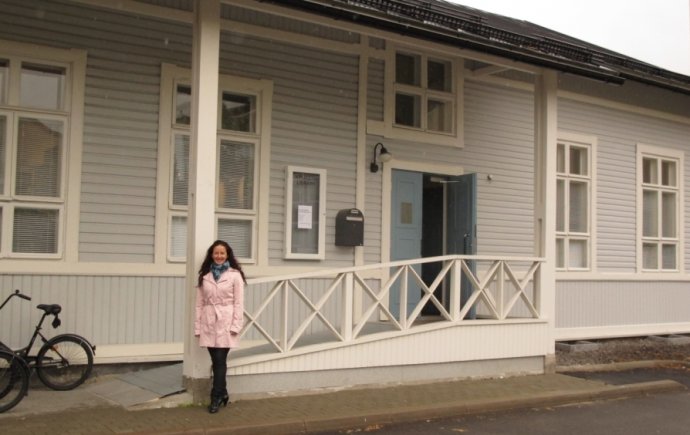Cooperation, networking and internationalisation at the Library of Mikkeli UAS
13.11.2012

Networking has been active for over ten years at the Mikkeli Region libraries. The Minister of Education opened the Mikkeli Library Network Mikki at the beginning of September 2001. Mikki is the concrete and practical result of the cooperation between Aalto University School of Economics Mikkeli Business Campus Library, Helsinki University Ruralia Institute Library, the Finnish Youth Institute Paukkula Library, and the Library and Information Services of Mikkeli University of Applied Sciences (MUAS), which comprise the Campus Library (Mikkeli), the Nikkarila Library (in Pieksämäki, shared with ESEDU), and the Savonniemi Campus Library (in Savonlinna).
When it was founded, Mikki was a forerunner in Finland, because it was a combination of libraries from universities, a university of applied sciences, and colleges. After the establishing of Mikki, there have been similar alliances in different cities in Finland. The common goal was that material borrowed from Mikki would be sent from one library to another within the Mikki network according to customers’ requests. The staff members and students from these educational establishments are the main customers but these libraries are also available to other customers.
We celebrated those ten years by organising a design competition for a new library card during autumn 2011. Anastasia Evdokimova, a second-year design student at MUAS, won the competition for the best proposal for the new library card. There were six proposals entered in the competition. The proposal made by Evdokimova is lively and colourful, representing movement and changes.
Cooperation in South-Eastern Finland
The venajaikkuna.fi website acts as a window to knowledge about Russia. The website is maintained by the three libraries of the universities of applied sciences of Kymenlaakso, Mikkeli and Saimaa (the latter now a part of Lappeenranta Science Library). It was carried out as a part of a larger Russian project financed by the Ministry of Culture and Education. On the website, you can find publications, lists of databases, current topics, contact addresses, and an extensive list of links concerning Russia.
The same project agreement concerning the Improvement of Russian Competence included a one-week visit in September 2010 to St Petersburg. Seven information specialists from the participating three universities were involved. Employees at the Russian libraries were amazed at the low number of staff in Finnish libraries. We, on the other hand, were taken aback by the huge collections at the Russian libraries.
Increasing internationality
The ARLICON conference has been held in June each year for the past decade. From 2007, the conference has consisted of two parts, the main one in St Petersburg and an additional programme organised in a foreign country. Russian librarians have visited Finland, Sweden and Denmark. This year they are going to Estonia. Every year they ask their university’s international department about the partner university in the foreign country. Dr Natalia Sokolova explained that their university, St Petersburg State Polytechnic University, has a partner agreement with our university. Mikkeli was recommended as a possible partner to arrange the joint conference in 2010. Sokolova commended our university library as “a really great partner”. The conference participants were surprised at how the library’s processes were run by only a small number of employees. Both libraries’ functions are rather similar and we have only minor differences in their implementation. The Russian librarians learned how to use the national bibliography effectively and they learned to share responsibilities between the library staff more effectively. At Russian libraries, they often have a narrow specialisation. They noticed that Finnish librarians know several languages, whereas at Russian libraries they usually know only Russian.
The Erasmus Lifelong Learning Programme gave to Katalin Farkas an opportunity to spend a week of professional practice in Savonlinna and Mikkeli in September 2011. In the past year, the universities have formed a partnership, built up a good working relationship, and implemented several projects together. The Savonniemi Campus in Savonlinna and the University of Szeged in Hungary offer similar training programmes, and the libraries have a similar profile.
During her visit, Katalin was interested in the existing collections and the method of new acquisitions. She was also interested in the catalogue system and the services offered. She wanted to get to know the best practices, including opening hours and introductory instructions given to new members.
Katalin wrote about the Savonniemi Campus Library, saying “it is very friendly, more like a home”. Inside, it is modern. The extent of the collection is similar to the Szeged campus library. However, the Savonniemi Library has a staff of three, which makes work much easier and produces better quality. For comparison, the Szeged campus library has only one person allocated to all similar tasks.
In Mikkeli, Katalin also visited “the impressive National Digital Library”, where the complete Finnish national collection is going to be archived in digital format in the near future. In Hungary, a similar project is taking place, but on a smaller scale. In Katalin’s opinion, strong national cooperation, smart solutions and one of the largest digitisation projects exemplify the Finnish library system. Katalin feels she has gained a wealth of experience from professional discussions, both at the Savonniemi Campus Library and at the Main Campus Library in Mikkeli.
Artikkelin tiedot
Kirjoittaja: Information Specialist Kirsti Karttunen
Numero: 2

Kommentit